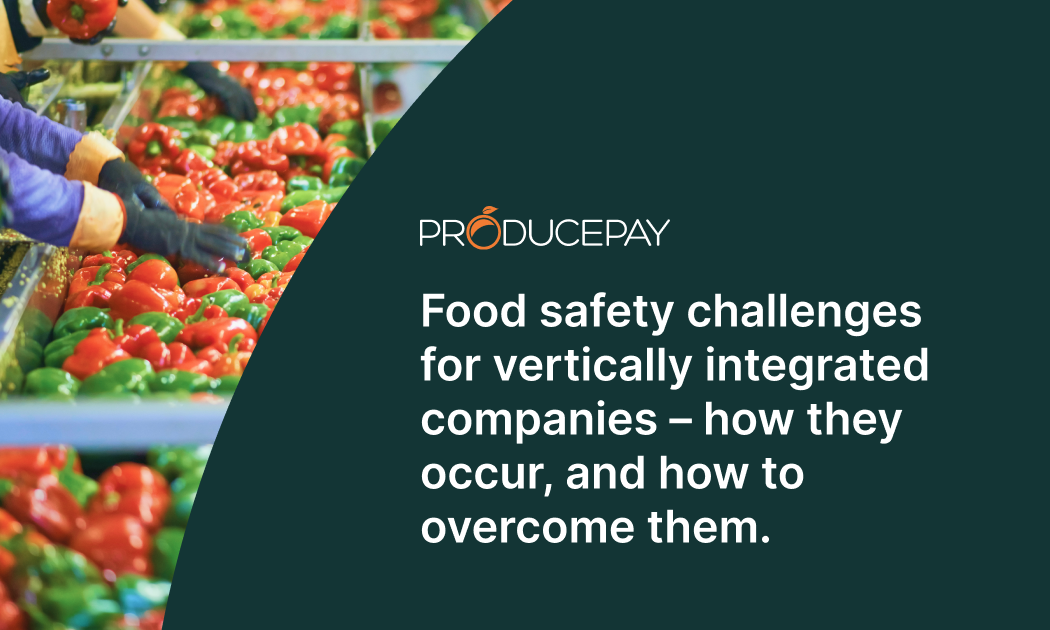
Food safety challenges for vertically integrated companies – how they occur, and how to overcome them.
The fresh produce supply chain provides sustenance to billions and employment to tens of millions. However, a single lapse in food safety can lead to recalls, and other health and economic consequences.
Vertically integrated companies, key players in the food manufacturing industry, grapple with numerous challenges in upholding food safety. These challenges range from the intricacies of sourcing raw materials to the complexity of cross-border supply chains to regulatory pressures.
Read on to understand why recalls are such a dreaded event, the key role of vertically integrated companies in driving food safety standards, and how ProducePay can help.
Food Safety and the Spectre of Recalls
According to the USDA, in 2022, 1,769,556 pounds of food was recalled. Recalls are a major headache for everyone involved, and every distributor’s nightmare.
Recalls (and lesser emergencies) occur because shipping food long distances is complicated. Factors such as temperature fluctuations, cross-contamination risks, and extended storage durations can compromise food quality and safety. With the food industry’s increasing globalization, supply chains have expanded, introducing more complexities and heightening the risk of disruptions.
Beyond the immediate health concerns, lapses in food safety can have a ripple effect on the economy. Recalls can lead to significant financial losses for companies, not just from the immediate cost of the recall itself but also from potential lawsuits, lost sales, and damage to brand reputation.
The key is to track food products right from their origin through every stage of production, processing, and distribution. Such traceability ensures that its source can be swiftly pinpointed if contamination occurs, facilitating prompt corrective actions. However, achieving this level of traceability is easier said than done. While there are food safety regulations in place that often provide a framework for supply chain management, the practical implementation can be daunting. Many operators, especially smaller ones, may lack the resources or expertise to establish comprehensive traceability systems.
Food Safety & Vertically Integrated Companies
At the heart of the complex global food system lie vertically integrated companies. As the backbone of the food supply, these companies uniquely position themselves to oversee multiple stages of the food production process, from cultivation to distribution. This integrated approach, while offering a holistic view of the supply chain, brings special challenges – and raises the risk of recalls.
With the food industry rapidly transforming into a global village, vertically integrated companies face the Herculean task of ensuring food safety across a tapestry of regions. Each region comes with its own set of regulations, cultural nuances, and potential pitfalls. This multifaceted structure, with its myriad of touchpoints and stakeholders, can inadvertently introduce vulnerabilities. These vulnerabilities can manifest in various ways, from contamination at the source to potential mishandling during transit.
Recent years have seen a shift in consumer sentiment. Media spotlights on food safety incidents have somewhat eroded the trust consumers place in the food they consume. As a result, vertically integrated companies often find themselves at the epicenter of these challenges.
A particular area of concern has been fresh produce, especially leafy greens, which have become a focal point in food safety debates. Alarming data suggests that nearly half of all foodborne outbreaks are linked to fresh leafy greens. Given their nature and cultivation methods, leafy greens can be susceptible to pathogens like E.COLI and Listeria. The root of this issue often traces back to potential contamination sources, such as irrigation water, or occasional oversights at processing facilities.
In light of these challenges, the industry’s approach to food safety is undergoing a paradigm shift. Reactive strategies, which kick in post food safety incidents like recalls, can have long-lasting repercussions on a supplier’s reputation and financial standing. Recognizing this, many integrated suppliers are pivoting towards a more proactive stance. This includes investments in cutting-edge tracking systems and collaborations with seasoned agronomists.
Vertically integrated companies are also those best positioned to drive sustainability – and sustainability practices often go hand-in-hand with food safety. For instance, sustainable farming practices can lead to reduced use of harmful pesticides, which in turn reduces the risk of chemical contamination. Similarly, sustainable water management can prevent the contamination of irrigation water, a known risk factor for certain foodborne pathogens.
How ProducePay Can Help Support Food Safety
Food safety is a complex challenge. To optimize their operations, every produce business needs the right mix of strategies, tools, and partnerships. Here at ProducePay, our platform of solutions can effectively augment broader food safety efforts, helping vertically integrated companies (and others) drive food safety standards.
- Pre-Season Working Capital: With access to working capital of up to 25% of annual sales secured in as little as 30 days, integrated partners and their growers can use this capital to invest in state-of-the-art food safety initiatives. This could include staff training, to stay updated on the latest industry standards and always be prepared for unforeseen health standard issues (such as global pandemics).
- In-Person Expertise: Our agronomists are on-site at our partner operations, providing industry best practices and sustainability educational programs to support our grower ecosystem. Their expertise can help play a role in meeting food safety goals. Our experts currently operate in 14 countries, and we’re expanding to many more, covering a wide range of commodities. We carefully match our agronomist and our farmers to create the most mutually beneficial relationships.
- On-Farm Intelligence with ProducePay Insights: Our platform offers real-time insights into price, movement, and market dynamics, empowering our members to make informed decisions in relation to every market dynamic – including food safety news and issues.
- Integrated Supply Chain Visibility: Our Visibility solution effectively supports food safety management by enabling advanced control and pallet-level traceability. Gain unparalleled end-to-end supply chain visibility from harvest to final destination through the integration of our agronomists + custom-built technology – all to ensure delivery of high-quality produce in full, on spec, and on time.
Interested in augmenting your food safety measures by onboarding our services? Talk to our ProducePay team today.

